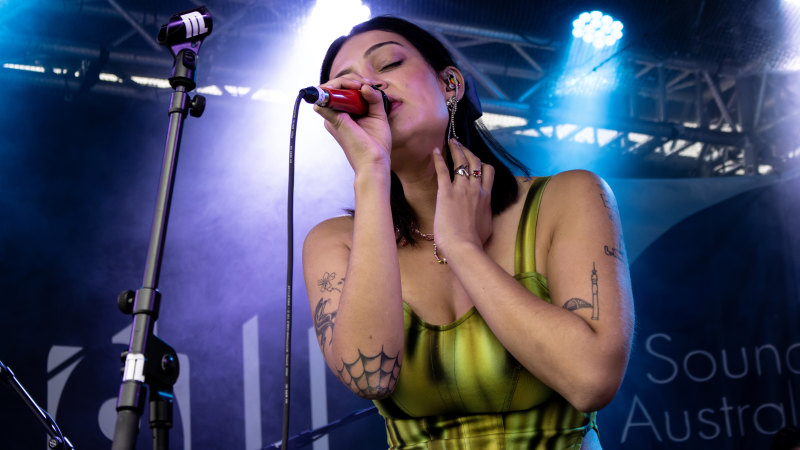The government has a plan to help break Aussie bands overseas. Will it work?

Save articles for later
Add articles to your saved list and come back to them any time.
Even before the pandemic, the Australian music industry struggled to gain a seat at the international table. An act can be massively popular locally but fail to register overseas, putting a hard ceiling on its ability to tour and sell records.
There have been artists who have graduated from beloved local favourites to globally renowned entities – but acts like Tame Impala, Courtney Barnett, or Flume are few and far between.
Thelma Plum performed as part of an Australian showcase at Reeperbahn Festival.Credit: Cordula Ditz
That’s where festivals like Texas institution SXSW (soon to make its Australian debut in Sydney), British equivalent The Great Escape, and Germany’s Reeperbahn Festival can play a role. They offer artists opportunities to showcase their talent and help break into overseas markets.
The Reeperbahn Festival, held in Hamburg, is one of Europe’s largest festivals, attracting approximately 50,000 visitors across four days in September. As part of the federal government’s new cultural policy, funding was allocated to allow Australian music industry representatives to attend the festival to help overcome cost barriers and promote Australian acts.
Sydney indie performer Annie Hamilton, one of the few self-managed Australian artists at Reeperbahn, noted that the opportunity to perform in Hamburg would not have been possible had she not put herself in the mix at another showcase discovery festival: SXSW.
“I met so many people from the European live industry that helped put this tour together,” she says. “The booking team saw my team at SXSW and booked me from that. In the 24 hours I’ve been in Hamburg, I’ve already had meetings with people who I want to join my team. The connections I’ve made at these events are amazing. It’s been incredible for my career.”
This new funding is a $5,000 stipend for managers courtesy of Sounds Australia – the national body responsible for helping Australian artists establish themselves overseas – and the Association of Artists Managers (AAM). It might not sound like much, but in an industry with small margins it can be the difference between making it or not.
Annie Hamilton performed as part of an Australian music showcase at Reeperbahn Festival.Credit: Cordula Ditz
Melbourne-based manager Cara Williams, whose agency Slow Clap currently represents punk group Private Function and rising punk outfit Gut Health, notes that her artists’ careers would have suffered had she not been able to attend an event like Reeperbahn.
“A manager’s presence at these types of events accelerates an artist’s international career and profile exponentially,” she says. “Relationships with those key players in an artist’s career are forged, and teams are built on ground. Geographical barriers are obliterated. Months or even years of work can be accomplished in one meeting.”
Maggie Collins, Executive Director at AAM, says the new initiative has the potential to significantly and permanently enhance Australian music development overseas.
“[It is an] initiative that provides direct financial and peer-to-peer support to assist managers who are attending global music events, as they develop and execute critical export strategies for their artists,” she says. “This investment in Australian managers today will see a return for artists and the wider industry tomorrow, nearly 20 times over.”
So, what happens when an Australian act finally gets the chance to perform to a massive, overseas crowd? Melbourne indie-rock five-piece Floodlights drew some of the biggest crowds of any Australian act at Reeperbahn – but they knew getting their show and vision to an international audience wasn’t going to be an easy process.
Floodlights performed as part of an Australian music showcase at Reeperbahn Festival.Credit: Cordula Ditz
“Ultimately, it’s a risk to spend your own money, time and resources to get over here when nothing is guaranteed,” guitarist/vocalist Louis Parsons says. “You might be hoping for a label or booking interest from festivals, but you might get nothing out of it. The way we see it, we do it for the passion of loving music and loving performing live. If we do something that might get us an opportunity to even make a full-time career out of it, we’re willing to do that.”
Guitarist/vocalist Ash Kehoe adds, “Getting to see these bands from all over the world, being in this environment, it’s so different to your usual shows. It’s never going to be a bad thing to come over and do this, regardless of what comes out of it.”
Festivals like Reeperbahn are giving some Australian artists their first chance since the pandemic to bring their music to new, overseas audiences.
“Coming out of lockdown, everything was in internet-land, you can get so lost,” Tori Zietsch, aka Maple Glider, says. “It doesn’t feel real sometimes, so being here and actually having people say they were grateful I’d travelled this far to come and play? It felt real.”
Being able to see where the music is hitting internationally, thanks to streaming numbers and statistics, is one thing. Being able to have those listeners approach you on the other side of the world and share their connection to your music with you is something that no streaming platform can offer.
Festivals like SXSW and Reeperbahn also attract representatives from international labels, booking agencies, festivals and more; for artists in Australia who are angling to expand their team overseas, being programmed on these event line-ups can be crucial in shifting the dial.
Sosefina Fuamoli attended the 2023 Reeperbahn Festival as a recipient of Creative Australia’s inaugural Music Writers’ Travel Bursary.
Find out the next TV, streaming series and movies to add to your must-sees. Get The Watchlist delivered every Thursday.
Most Viewed in Culture
From our partners
Source: Read Full Article


